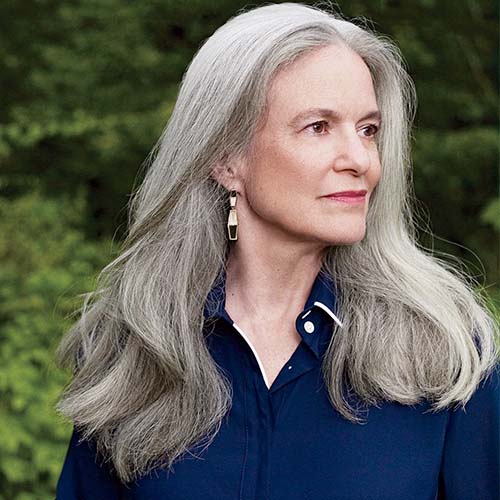Visiting Poets
Sharon Olds
Visceral and transformative, Sharon Olds’ poems barrel down into that place in us that we “want never to know.” Michael Ondaatje has called her work “pure fire in the hands—risky, on the verge of falling, and in the end, leaping up.” Writing on such subjects as family, alcoholism, death, sex, mothering, and the horrors of violence and war, Olds writes stark, potent, and cathartic poetry—brutally honest and beautiful in its stripped-down artistry. Olds’ dazzling and harrowing voice surprises, haunts, and pleasures.
“Her work exhibits a lyrical acuity which is both purifying and redemptive,” writes David Leavitt. “Sharon Olds is enormously self-aware; her poetry is remarkable for its candor, its eroticism, and its power to move.” Her audience is wide and fiercely loyal. As The Poetry Foundation attests, “Olds is undeniably one of the most popular and accessible living American poets, and one of the few that has won a following among general readers.”
The author of eight books of poetry, Olds is a Chancellor of the Academy of American Poets and the recipient of numerous awards, including a Guggenheim Fellowship, a National Endowment for the Arts Fellowship, the Lamont Poetry Selection, a National Book Critics Circle Award, and an Academy of American Poets Fellowship. Her work has been reprinted in over 100 anthologies and appears regularly in The New Yorker and other major journals. Olds served as the New York State Poet Laureate from 1998-2000. Currently, she is Erich Maria Remarque Professor in the Creative Writing Program at New York University and also oversees the poetry workshop she founded in 1984 at New York’s Goldwater Hospital for the severely disabled.
Select Poems
I see them standing at the formal gates of their colleges,
I see my father strolling out
under the ochre sandstone arch, the
red tiles glinting like bent
plates of blood behind his head, I
see my mother with a few light books at her hip
standing at the pillar made of tiny bricks,
the wrought-iron gate still open behind her, its
sword-tips aglow in the May air,
they are about to graduate, they are about to get married,
they are kids, they are dumb, all they know is they are
innocent, they would never hurt anybody.
I want to go up to them and say Stop,
don’t do it—she’s the wrong woman,
he’s the wrong man, you are going to do things
you cannot imagine you would ever do,
you are going to do bad things to children,
you are going to suffer in ways you have not heard of,
you are going to want to die. I want to go
up to them there in the late May sunlight and say it,
her hungry pretty face turning to me,
her pitiful beautiful untouched body,
his arrogant handsome face turning to me,
his pitiful beautiful untouched body,
but I don’t do it. I want to live. I
take them up like the male and female
paper dolls and bang them together
at the hips, like chips of flint, as if to
strike sparks from them, I say
Do what you are going to do, and I will tell about it.
From THE GOLD CELL (Knopf, 1987)
Bending over, at the August table
where the summer towels are kept, putting
a stack on the bottom shelf, I felt his
kiss, in its shock of whiskers, on an inner
curve of that place I know by his knowing,
have seen with the vision of his touch. To be entered
thus, on a hip-high table piled with
sheaves of towels, bath and hand,
terry-cloth eden, is to feel at one’s center
a core of liquid heat as if
one is an earth. Some time later,
we were kissing in near sleep, I think
we did it this time, I whispered, I think
we’re joined at the hip. He has a smile sometimes
from the heart; at this hour, I live in its light.
I gnaw very gently on his jaw, Would you want me to
eat you, in the Andes, in a plane crash, I murmur,
to survive? Yes. We smile. He asks,
Would you want me to eat you to survive? I would love it,
I cry out. We almost sleep, there is a series of
arms around us and between us, in sets,
touches given as if received. Did you think
we were going to turn into each other?, and I get
one of those smiles, as if his face
is a speckled, rubbled, sandy, satiny
cactus-flower eight inches across.
Yes, he whispers. I know he is humoring,
rote sweet-talking. A sliver of late
sun is coming through, between the curtains,
it illumines the scaly surfaces
of my knuckles, its line like a needle held,
to cleanse it, above a match. I move
my wedding finger to stand in the slit
of flame. From the ring’s curve there rises
a fan of borealis fur
like the first instant of sunrise. Do not
tell me this could end. Do not tell me.
From THE UNSWEPT ROOM (Knopf, 2002)

